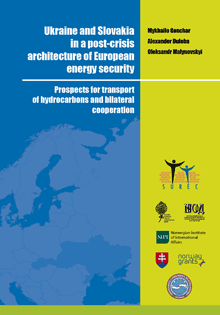
Erdogan’s legacy for Turkey in his final term Turkey's 17th general election was never an election about who would win; it was a foregone conclusion that the Justice and Development Party (AK Party) would do that and that Recep Tayyip Erdogan, in his final term as the prime minister, would be given not only the mandate to govern but also the moral authority to forge Turkey’s future in the next four years and, arguably, beyond. READ MORE
- By Mehmet Ogutcu, Formely Turkish Diplomat, Head of OECD Global Forum and currently Multinational Executive and Sir David Logan, Former UK Ambassador to Turkey and Chairman of British Institute in Ankara |
Published on EGF: 21.07.2011
| Security
-
Ukraine and Slovakia in a post-crisis architecture of European energy security 
(6 Mb)
 A wide strip of mainland and continental shelf territory starting from the Rus- sian sector of the Arctic up to the Arabian Peninsula can be labelled an Arctic - Arabian hydrocarbon belt (CH-belt) of Eurasia. It is the strip where the major mainland oil and gas fields are located on the territory of Russia, Kazakhstan, Uzbekistan, Turkmenistan, Iran, and the Gulf and Arabian Peninsula countries. As the production of hydrocarbons has been developing, transport routes to the markets of their consumption, the major of which is the European Union, started to branch off this diagonal CH-belt of Eurasia in the latitudinal direction. Practically, these transport routes connect the area of production (upstream) with the consumption market (downstream).
A wide strip of mainland and continental shelf territory starting from the Rus- sian sector of the Arctic up to the Arabian Peninsula can be labelled an Arctic - Arabian hydrocarbon belt (CH-belt) of Eurasia. It is the strip where the major mainland oil and gas fields are located on the territory of Russia, Kazakhstan, Uzbekistan, Turkmenistan, Iran, and the Gulf and Arabian Peninsula countries. As the production of hydrocarbons has been developing, transport routes to the markets of their consumption, the major of which is the European Union, started to branch off this diagonal CH-belt of Eurasia in the latitudinal direction. Practically, these transport routes connect the area of production (upstream) with the consumption market (downstream).
- Mykhailo Gonchar, Alexander Duleba, Oleksandr Malynovskyi |
Published on EGF: 27.06.2011
| Energy
-
The Marrakesh bombings and Morocco’s precarious security environment 
(158 Kb)
Morocco’s stable security image shattered in April
Morocco witnessed a severe blow to its external image as one of the more stable and least dangerous North African Maghreb countries at the end of last month, when an apparent suicide bombing in the city of Marrakesh led to the deaths of 17 persons, including a number of foreign nationals. The fatal blast, which took place in a café in Marrakesh’s iconic Djemaa el-Fna square (a Unesco World Heritage site popular with European tourists) on April 28, was the first major, apparent act of terrorism in the country since the 2003 bombings in Casablanca which killed up to 45 people. READ MORE
- Marco Pantelakis and Mhamed Biygautane |
Published on EGF: 16.05.2011
| Security
-
Algeria: The Risks of slipping into deeper political crisis
By Eugen Iladi, Independent Expert
The dramatic events in Tunisia and Egypt, where long-serving presidents have been ousted within weeks of each other by “street-led people’s revolts”, are inspiring demonstrators in other Muslim countries to demand structural political change. Libya is currently gripped by deep political crisis, as is the tiny Gulf Monarchy of Bahrain, whilst revolts are ongoing in Yemen, Morocco and Iran. Furthermore, Algeria seems to be one of the next countries possibly hanging in the balance, where the prospect of regime change must now be a question of serious concern.
Algeria is a country of vital importance both to the stability of the wider-Maghreb and Sahel-Sahara region as well as to European interests. The country is a major energy supplier to international markets. Sonatrach, Algeria’s national oil and gas champion is crucial to the country's ability to generate public revenues and any disruption would simply lead to more strife in the country. Sonatrach and Algerian oil and gas resources are important not just to Algeria: the European Union's security of energy supplies, U.S. energy interests, as well as Russia's energy investments all stand to suffer if Algeria becomes unreliable. Add to that fears of an Islamist resurgence in the country and, worse, the existing Al Qaeda threat in the Maghreb, and we are witnessing a very volatile concoction in a region not far removed from civil war and unresolved border disputes. READ MORE
- Eugen Iladi |
Published on EGF: 25.04.2011
| Security
-
Moscow Domodedovo airport terror act: between shallow security and social unrest
Mikhail Roshchin, EGF Affiliated Expert
While many in Russia have become accustomed to gas disputes with Ukraine as the flagship event hailing in the New Year, the start of 2011 brought with it a far more tragic security crisis when a major bomb blast ripped through the crowded halls of Moscow’s Domodedovo airport. The attack occurred in the arrivals area of the airport at 4.32 pm, on 24 January 2011, claiming the lives of 36 individuals and injuring 116 more. An act of terrorism was immediately assumed by many security experts, possibly involving a suicide bomber, who employed an explosive device containing 5-7 kilogrammes of Trinitrotoluene (TNT). Among the victims was Anna Yablonskaya, a 29-years-old Ukrainian playwright and poet who had come to Moscow to receive a prize from the magazine Art of the Cinema for her recent play. This attack follows the March 2010 suicide bombing in which two women, originally from Dagestan, blew themselves up in Moscow’s underground causing the death of 40 commuters. As was the case in the March 2010 attack, separatist-terrorists from the Russian North Caucasus were suspected of involvement in the Domodedovo attacks. These suspicions appeared to be confirmed earlier this month, when Chechen rebel leader, Doku Umarov, claimed responsibility for the bombing on February 4. In his video broadcast confirming responsibility for the attack, Umarov justified his actions on the basis of Russian state policy in the North Caucasus. READ MORE
- Mikhail Roshchin |
Published on EGF: 25.04.2011
| Security
-
Ukrainians are not afraid of terrorist attacks – survey 
(215 Kb)

On January 24th through January 26th, 2011, Gorshenin Institute has conducted a phone survey "Explosions in Makeyevka". A total of 1000 respondents age 18 or older representing all 25 regional centers, Kiev and Sebastopol, were selected at random following a systematic procedure aimed at filling sex, age and community quotas. The margin of error is no higher then +/-3.2%. Results of the survey conducted among the residents of Makeyevka are presented separately. READ MORE
- Gorshenin Institute |
Published on EGF: 02.02.2011
| Security
-
Russia and NATO: "Not a piece of furniture" The results of the NATO summit were as predictable as a Soviet Communist Party congress, with the word "peace" replaced by "war". NATO's embrace of the US agenda of missile defence, nuclear arms, and its new role as global policeman surprised no one. No word about the United Nations or peacekeeping. In deference to Russia, the only mention of eastern expansion was continued "partnerships" with former Soviet republics Ukraine and Georgia. Indonesia, Malaysia, Australia, New Zealand and Japan were also offered special status. The new Strategic Doctrine, replacing the more modest Euro-centric 1999 model, really just reaffirmed US control of the foreign policy of what Zbigniew Brzezinski called its "vassal states."
- Eric Walberg |
Published on EGF: 27.11.2010
| External Relations
-
The Tanks of August 
The publication of this collection of essays coincides with the second anniversary of the armed conflict between Russia and Georgia on August 8-12, 2009.
The first essay looks into the transformation of the Georgian armed forces under President Mikhail Saakashvili and details Tbilisi’s key preparations for the war.
- The Centre for Analysis of Strategies and Technologies |
Published on EGF: 16.08.2010
| Energy
-
Securing Energy and Building Regional Security: EU-Turkey Cooperation in the Black and Caspian Seas Basin 
(142 Kb)
Turkey’s importance to the EU should not be underestimated
Turkey’s unique geopolitical position, straddling both Europe and Asia (encompassing its proximity in the Middle East, Caucuses, Balkans, and Black & Caspian Sea regions specifically), has placed the country into a very advantageous position amongst all actors that are involved in any of these areas. Its longstanding membership in NATO and the Council of Europe, in addition to its historical military partnership with Israel, further underscores the fact that Turkey has long been, and continues to be, a partner of strategic importance to the West. Furthermore, with no end in sight to Europe’s reliance on imported Eurasian and Russian gas supplies, Turkey’s territory is the crossroads for the planned NABUCCO gas pipeline, which intends to decrease European reliance on Russian gas.
- EGF Editorial |
Published on EGF: 02.06.2010
| Energy
-


